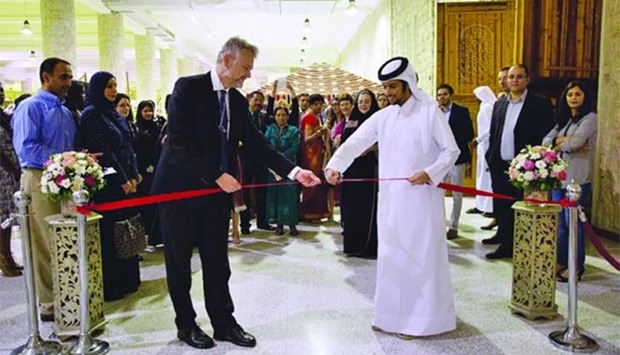Sheikh Faisal Bin Qassim Al Thani Museum in partnership with UCL Qatar have curated an exhibition that aims to create a dialogue between different generations and cultures through the objects and the stories that will be showcased.
The annual exhibition at one of the biggest private museums in the world and organised by UCL Qatar’s MA Museum and Gallery Practice students was inaugurated by Sheikh Turki bin Faisal al-Thani.
‘Shifting Sands – A Journey of Qatar and its People,’ to be displayed in the temporary exhibition space at the Sheikh Faisal Bin Qassim Al Thani Museum will showcase many fine exhibits from different parts of the museum, ranging from archaeological objects to a vehicle, demonstrating the range and depth of Sheikh Faisal’s collection. The journey of Qatar, its people and objects will be presented along with the stories that they collectively hold.
Being a part of International Council of Museums, Sheikh Faisal Bin Qassim Al Thani Museum is described as the most unique facility with the most eclectic collection, and has something for everyone: culture vultures, history buffs, adventurers, art connoisseurs and even vacationers.
Among the highlights include an entire house from Damascus old town, a wooden confessional, the vintage cars, a fossilised dinosaur head, a fully functional F1 car, an aeroplane, a 2cm Qur’an, and the largest privately-owned weapons collection in the world and many other astonishing exhibits.
Set to create a unique experience, the exhibition by UCL Qatar’s MA Museum and Gallery Practice students will incorporate different mediums and means of display such as the use of story-telling, interviews and videos. To be held under four vivid themes, this exhibition will demonstrate the changes in Doha, while showcasing the rich diversity of people who have been, and, are still living in Qatar.
‘Life in the desert’ will feature key elements of life in the desert that form the basis for traditions that characterise people’s relationship with the physical environment in Qatar and ‘Changing landscape’ will showcase the change in the social landscape of Qatar, including the physical landscape, and its impact on people’s lives and their customs.
‘Socialising,’ as a social practice, was essential in the past as a tool for communication and survival. The exhibition reveals a rich tradition of hospitality that connects friends and family, and creates bridges between cultures. Visitors will have several resting points to engage with the collection more intimately. ‘Icons’ will represent the culture of Qatar, and are resolute icons that are associated with its people and have remained steady throughout the country’s physical and cultural transformation.
The exhibition project is a practical, key element of the MA Museum and Gallery Practice, allowing students to work as a team to organise a public exhibition from concept development to opening. During the event, students take on key roles such as curation and interpretation, project management, exhibition design, education and outreach, and marketing.
Established in 1998 in the grand Qatari fort at Al Samriya Farm, The Sheikh Faisal Museum with its magnificent exterior attracts people from all over the world. Sheikh Faisal, the founder of the museum, is one of the Middle East's most prominent business leaders who has had the dedication and passion in collecting art and artifacts of global importance.
The rare and precious pieces of collections epitomise the travels that Sheikh Faisal has taken across several countries over the last 50 years. Sheikh Faisal's steady eye for tradition, culture, history and legitimacy particularly in preserving Islamic and Qatari custom, is evidently established within the museum's exceptional collections.
Under the patronage of the League of Arab States, the Arab Centre for Tourism Media in 2012 awarded Sheikh Faisal the well-earned title of 'Heritage personality for 2012.'

Sheikh Turki bin Faisal al-Thani inaugurates the exhibition ‘Shifting Sands u2013 A Journey of Qatar and its People.’
